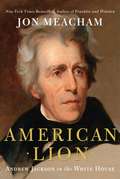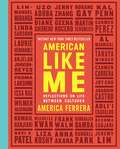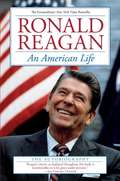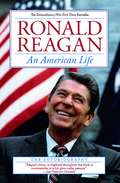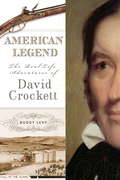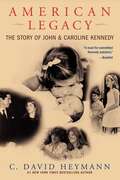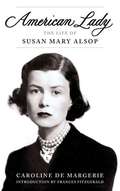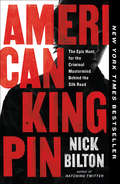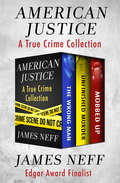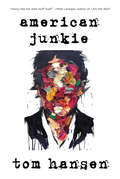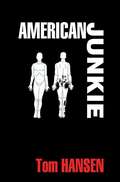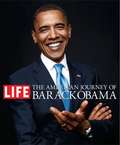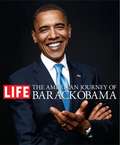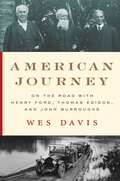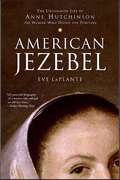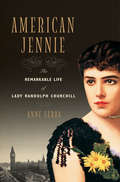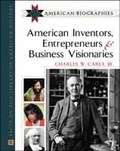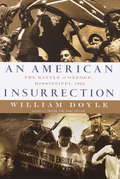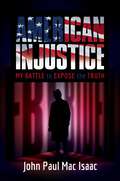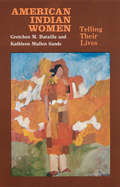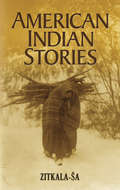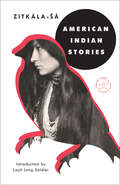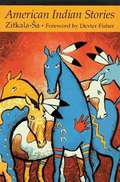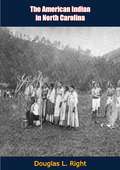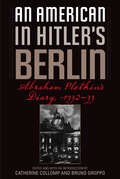- Table View
- List View
American Lion: Andrew Jackson in the White House
by Jon MeachamAndrew Jackson, his intimate circle of friends, and his tumultuous times are at the heart of this remarkable book about the man who rose from nothing to create the modern presidency. Beloved and hated, venerated and reviled, Andrew Jackson was an orphan who fought his way to the pinnacle of power, bending the nation to his will in the cause of democracy. Jackson's election in 1828 ushered in a new and lasting era in which the people, not distant elites, were the guiding force in American politics. Democracy made its stand in the Jackson years, and he gave voice to the hopes and the fears of a restless, changing nation facing challenging times at home and threats abroad. To tell the saga of Jackson's presidency, acclaimed author Jon Meacham goes inside the Jackson White House. Drawing on newly discovered family letters and papers, he details the human drama-the family, the women, and the inner circle of advisers-that shaped Jackson's private world through years of storm and victory. One of our most significant yet dimly recalled presidents, Jackson was a battle-hardened warrior, the founder of the Democratic Party, and the architect of the presidency as we know it. His story is one of violence, sex, courage, and tragedy. With his powerful persona, his evident bravery, and his mystical connection to the people, Jackson moved the White House from the periphery of government to the center of national action, articulating a vision of change that challenged entrenched interests to heed the popular will-or face his formidable wrath. The greatest of the presidents who have followed Jackson in the White House-from Lincoln to Theodore Roosevelt to FDR to Truman-have found inspiration in his example, and virtue in his vision. Jackson was the most contradictory of men. The architect of the removal of Indians from their native lands, he was warmly sentimental and risked everything to give more power to ordinary citizens. He was, in short, a lot like his country: alternately kind and vicious, brilliant and blind; and a man who fought a lifelong war to keep the republic safe-no matter what it took. Jon Meacham in American Lion has delivered the definitive human portrait of a pivotal president who forever changed the American presidency-and America itself.<P><P> Pulitzer Prize Winner
American Like Me: Reflections on Life Between Cultures
by America FerreraFrom award-winning actress and political activist America Ferrera comes a vibrant and varied collection of first person accounts from prominent figures about the experience of growing up between cultures. <P><P>America Ferrera has always felt wholly American, and yet, her identity is inextricably linked to her parents’ homeland and Honduran culture. Speaking Spanish at home, having Saturday-morning-salsa-dance-parties in the kitchen, and eating tamales alongside apple pie at Christmas never seemed at odds with her American identity. Still, she yearned to see that identity reflected in the larger American narrative. <P><P>Now, in American Like Me, America invites thirty-one of her friends, peers, and heroes to share their stories about life between cultures. We know them as actors, comedians, athletes, politicians, artists, and writers. However, they are also immigrants, children or grandchildren of immigrants, indigenous people, or people who otherwise grew up with deep and personal connections to more than one culture. <P><P>Each of them struggled to establish a sense of self, find belonging, and feel seen. And they call themselves American enthusiastically, reluctantly, or not at all. Ranging from the heartfelt to the hilarious, their stories shine a light on a quintessentially American experience and will appeal to anyone with a complicated relationship to family, culture, and growing up. <P><b>A New York Times Bestseller</b>
An American Life: An Enhanced eBook with CBS Video
by Ronald ReaganRonald Reagan's autobiography is a work of major historical importance. Here, in his own words, is the story of his life--public and private--told in a book both frank and compellingly readable. Few presidents have accomplished more, or been so effective in changing the direction of government in ways that are both fundamental and lasting, than Ronald Reagan. Certainly no president has more dramatically raised the American spirit, or done so much to restore national strength and self-confidence. Here, then, is a truly American success story--a great and inspiring one. From modest beginnings as the son of a shoe salesman in Tampico, Illinois, Ronald Reagan achieved first a distinguished career in Hollywood and then, as governor of California and as president of the most powerful nation in the world, a career of public service unique in our history. Ronald Reagan's account of that rise is told here with all the uncompromising candor, modesty, and wit that made him perhaps the most able communicator ever to occupy the White House, and also with the sense of drama of a gifted natural storyteller. He tells us, with warmth and pride, of his early years and of the elements that made him, in later life, a leader of such stubborn integrity, courage, and clear-minded optimism. Reading the account of this childhood, we understand how his parents, struggling to make ends meet despite family problems and the rigors of the Depression, shaped his belief in the virtues of American life--the need to help others, the desire to get ahead and to get things done, the deep trust in the basic goodness, values, and sense of justice of the American people--virtues that few presidents have expressed more eloquently than Ronald Reagan. With absolute authority and a keen eye for the details and the anecdotes that humanize history, Ronald Reagan takes the reader behind the scenes of his extraordinary career, from his first political experiences as president of the Screen Actors Guild (including his first meeting with a beautiful young actress who was later to become Nancy Reagan) to such high points of his presidency as the November 1985 Geneva meeting with Mikhail Gorbachev, during which Reagan invited the Soviet leader outside for a breath of fresh air and then took him off for a walk and a man-to-man chat, without aides, that set the course for arms reduction and charted the end of the Cold War. Here he reveals what went on behind his decision to enter politics and run for the governorship of California, the speech nominating Barry Goldwater that first made Reagan a national political figure, his race for the presidency, his relations with the members of his own cabinet, and his frustrations with Congress. He gives us the details of the great themes and dramatic crises of his eight years in office, from Lebanon to Grenada, from the struggle to achieve arms control to tax reform, from Iran-Contra to the visits abroad that did so much to reestablish the United States in the eyes of the world as a friendly and peaceful power. His narrative is full of insights, from the unseen dangers of Gorbachev's first visit to the United States to Reagan's own personal correspondence with major foreign leaders, as well as his innermost feelings about life in the White House, the assassination attempt, his family--and the enduring love between himself and Mrs. Reagan. An American Life is a warm, richly detailed, and deeply human book, a brilliant self-portrait, a significant work of history.
An American Life
by Ronald ReaganRonald Reagan's autobiography is a work of major historical importance. Here, in his own words, is the story of his life--public and private--told in a book both frank and compellingly readable. Few presidents have accomplished more, or been so effective in changing the direction of government in ways that are both fundamental and lasting, than Ronald Reagan. Certainly no president has more dramatically raised the American spirit, or done so much to restore national strength and self-confidence. Here, then, is a truly American success story--a great and inspiring one. From modest beginnings as the son of a shoe salesman in Tampico, Illinois, Ronald Reagan achieved first a distinguished career in Hollywood and then, as governor of California and as president of the most powerful nation in the world, a career of public service unique in our history. Ronald Reagan's account of that rise is told here with all the uncompromising candor, modesty, and wit that made him perhaps the most able communicator ever to occupy the White House, and also with the sense of drama of a gifted natural storyteller. He tells us, with warmth and pride, of his early years and of the elements that made him, in later life, a leader of such stubborn integrity, courage, and clear-minded optimism. Reading the account of this childhood, we understand how his parents, struggling to make ends meet despite family problems and the rigors of the Depression, shaped his belief in the virtues of American life--the need to help others, the desire to get ahead and to get things done, the deep trust in the basic goodness, values, and sense of justice of the American people--virtues that few presidents have expressed more eloquently than Ronald Reagan. With absolute authority and a keen eye for the details and the anecdotes that humanize history, Ronald Reagan takes the reader behind the scenes of his extraordinary career, from his first political experiences as president of the Screen Actors Guild (including his first meeting with a beautiful young actress who was later to become Nancy Reagan) to such high points of his presidency as the November 1985 Geneva meeting with Mikhail Gorbachev, during which Reagan invited the Soviet leader outside for a breath of fresh air and then took him off for a walk and a man-to-man chat, without aides, that set the course for arms reduction and charted the end of the Cold War. Here he reveals what went on behind his decision to enter politics and run for the governorship of California, the speech nominating Barry Goldwater that first made Reagan a national political figure, his race for the presidency, his relations with the members of his own cabinet, and his frustrations with Congress. He gives us the details of the great themes and dramatic crises of his eight years in office, from Lebanon to Grenada, from the struggle to achieve arms control to tax reform, from Iran-Contra to the visits abroad that did so much to reestablish the United States in the eyes of the world as a friendly and peaceful power. His narrative is full of insights, from the unseen dangers of Gorbachev's first visit to the United States to Reagan's own personal correspondence with major foreign leaders, as well as his innermost feelings about life in the White House, the assassination attempt, his family--and the enduring love between himself and Mrs. Reagan. An American Life is a warm, richly detailed, and deeply human book, a brilliant self-portrait, a significant work of history.
American Legend: The Real-Life Adventures of David Crockett
by Buddy LevyDavid Crockett was an adventurer, a pioneer, and a tragic hero who died at the Alamo. But the life of the real Crockett has been largely obscured and overshadowed by his mythology, turning this honest, unassuming backwoodsman into a larger-than-life, Disney-fied character in a coonskin cap. <P> In his short but distinguished lifetime, Crockett became America's original celebrity, frequently written about in newspapers and becoming an integral part of the folklore of his day. Opportunistic and clever, and presciently media-savvy, Crockett parlayed his humble origins to his advantage, using his charismatic frontiersman persona to win elections as a three-time U.S. Congressman and even a nomination as presidential candidate. The 1834 publication of his memoir, A Narrative of the Life of David Crockett-by Himself, one of the first autobiographies of its kind, went through seven printings, and sent Crockett on the first-ever book tour across the Eastern seaboard. <P> At heart, Crockett was unassuming and down-to-earth, obstinate and independent to a fault. In a beautifully descriptive narrative, American Legend takes readers from Crockett's childhood hardships, near-death experiences, and meager education through his unlikely rise to Congress. Though his death at the Alamo on March 6, 1836, only added to his considerable fame and notoriety, the common David Crockett emerges here as never before: a rugged individual, an American original, and an enduring symbol of the American spirit
American Legacy: The Story of John & Caroline Kennedy
by C. David HeymannFrom the moment of their births, John and Caroline Kennedy occupied a central position in what is generally regarded as the most famous family in the United States, if not the world. Even as young children growing up in the White House, their most subtle gestures and actions made headlines.... Yet until now they have not been the subject of a dual biography. In that sense, this volume represents a first. In American Legacy, #1 New York Times bestselling author C. David Heymann draws upon a voluminous archive of personal interviews to present a telling portrait of John and Caroline Kennedy. A longtime biographer of various members of the Kennedy clan, including Jackie and Robert Kennedy, Heymann covers John's and Caroline's childhood in the White House, the dark aftermath of their father's assassination, their uneasy adolescence, and the many challenges they faced as adults, all under the glaring eye of the media. He reveals John's and Caroline's loving but at times trying relationship with their larger-than-life mother, as well as Jackie's own emotional struggles, romantic relationships, and financial concerns following JFK's death. Other revelations brought to light for the first time in American Legacy include the assassination attempt made on Jackie just before she gave birth to John; JFK Jr.'s romantic escapades prior to marrying Carolyn Bessette and accounts of the predominantly happy marriage they shared despite criticisms from questionable sources; the shocking report of the autopsy performed on John following the tragic plane crash that killed him, Carolyn, and her sister Lauren; Caroline's rise to become one of the wealthiest women in America and her life now as the sole keeper of her family's magnificently complex legacy. Utterly compelling and full of new and fascinating details, American Legacy overturns much of what we thought we knew about two of the most talked-about members of the Kennedy family.
American Lady: The Life of Susan Mary Alsop
by Caroline De MargerieThe fascinating story of one of the grand dames of Georgetown society and a true Washington insider Henry Kissinger once remarked that more agreements were concluded in the living room of Susan Mary Alsop than in the White House. A descendent of Founding Father John Jay, Susan Mary was an American aristocrat whose first marriage gave her full access to post-war diplomatic social life in Paris. There, her circle of friends included Winston Churchill, Isaiah Berlin, Evelyn Waugh, and Christian Dior, among other luminaries, and she had a passionate love affair with British ambassador Duff Cooper. During the golden years of John F. Kennedy’s presidency-after she had married the powerful journalist Joe Alsop-her Washington home was a gathering place for everyone of importance, including Katharine Graham, Robert McNamara, and Henry Kissinger. Dubbed "the second lady of Camelot,” she hosted dinner parties that were the epitome of political power and social arrival, bringing together the movers and shakers not just of the United States, but of the world. Featuring an introduction by Susan Mary Alsop’s goddaughter Frances FitzGerald, American Lady is a fascinating chronicle of a woman who witnessed, as Nancy Mitford once said, "history on the boil. ” .
American Kingpin: The Epic Hunt for the Criminal Mastermind Behind the Silk Road
by Nick BiltonThe unbelievable true story of the man who built a billion-dollar online drug empire from his bedroom—and almost got away with it In 2011, a twenty-six-year-old libertarian programmer named Ross Ulbricht launched the ultimate free market: the Silk Road, a clandestine Web site hosted on the Dark Web where anyone could trade anything—drugs, hacking software, forged passports, counterfeit cash, poisons—free of the government’s watchful eye. It wasn’t long before the media got wind of the new Web site where anyone—not just teenagers and weed dealers but terrorists and black hat hackers—could buy and sell contraband detection-free. Spurred by a public outcry, the federal government launched an epic two-year manhunt for the site’s elusive proprietor, with no leads, no witnesses, and no clear jurisdiction. All the investigators knew was that whoever was running the site called himself the Dread Pirate Roberts. The Silk Road quickly ballooned into $1.2 billion enterprise, and Ross embraced his new role as kingpin. He enlisted a loyal crew of allies in high and low places, all as addicted to the danger and thrill of running an illegal marketplace as their customers were to the heroin they sold. Through his network he got wind of the target on his back and took drastic steps to protect himself—including ordering a hit on a former employee. As Ross made plans to disappear forever, the Feds raced against the clock to catch a man they weren’t sure even existed, searching for a needle in the haystack of the global Internet. Drawing on exclusive access to key players and two billion digital words and images Ross left behind, Vanity Fair correspondent and New York Times bestselling author Nick Bilton offers a tale filled with twists and turns, lucky breaks and unbelievable close calls. It’s a story of the boy next door’s ambition gone criminal, spurred on by the clash between the new world of libertarian-leaning, anonymous, decentralized Web advocates and the old world of government control, order, and the rule of law. Filled with unforgettable characters and capped by an astonishing climax, American Kingpin might be dismissed as too outrageous for fiction. But it’s all too real.
American Justice: A True Crime Collection
by James NeffThree shocking tales of violence, intrigue, and the search for truth from a two-time Edgar Award finalist and Ann Rule&’s &“favorite true-crime writer.&” In this riveting collection, prize-winning investigative journalist James Neff examines the Dr. Sam Sheppard murder mystery; the terrifying pursuit of a serial rapist in Cleveland, Ohio; and the spectacular rise and fall of Teamster boss Jackie Presser. The Wrong Man: In 1954, in suburban Cleveland, Dr. Sam Sheppard&’s wife, Marilyn, was beaten to death in their home. Investigators, the press, the public, and the courts worked in lockstep to convict Sheppard. Sentenced to life in prison, he served nearly a decade before he was acquitted in a retrial. Culled from DNA evidence, testimony that was never heard in court, prison diaries, and interviews with key players, The Wrong Man makes a convincing case for Sheppard&’s innocence and reveals the identity of the true killer. &“Gripping and meticulously researched . . . [A] first-degree murder mystery&” (People). Unfinished Murder: From 1983 to 1988, serial rapist Ronnie Shelton preyed on the women of Cleveland. Dubbed the West Side Rapist, he spied on his victims, stalked them, and brutally assaulted them in their homes. Arrested at least fifteen times for other crimes, Shelton slipped through the cracks of the justice system so often it seemed he&’d never be caught—until his courageous victims united to put him behind bars. A finalist for the Edgar Award, Unfinished Murder is based on more than 150 interviews with the survivors, the police, psychiatrists, and Shelton himself, who was sentenced to 3,195 years in prison, the longest in Ohio state history. Mobbed Up: As the president of America&’s largest labor union, Jackie Presser navigated a dangerous balancing act with the Teamsters, the Mafia, and the Justice Department. At the same time he was taking orders from New York mob boss Fat Tony Salerno, Presser was serving as the FBI&’s top informant on organized crime. Drawing on thousands of pages of classified files, Neff follows the trail of greed and hubris all the way to the Nixon and Reagan White Houses, where Presser was treated as a valued friend. &“[A] damning tale . . . A portrait of pervasive corruption that should concern anyone who cares about the way this country works&” (Los Angeles Times).
American Junkie
by Tom HansenA non-stop trip into one man's land of desperate addicts, failed punk bands, and brushes with sad fame, as he sells drugs during the Seattle grunge years. In American Junkie, Tom Hansen maps his heroin addiction, from the promise of a young life to the prison of a mattress, from budding musician to broken down junkie, drowning in syringes and cigarette butts, shooting heroin into wounds the size of softballs, and ultimately, a ride to a hospital for a six-month stay and a painful self-discovery that cuts down to the bone. Through it all he never really loses his step, never lets go of his smarts, and always projects quintessential American reason, humor, and hope to make a story not only about drugs, but a compelling study of vulnerability and toughness.
American Junkie
by Tom HansenIn American Junkie, Tom Hansen takes us on a non-stop into a land of desperate addicts, failed punk bands, and brushes with sad fame selling drugs during the Seattle grunge years. It's a story that takes us from the promise of a young life to the prison of a mattress, from budding musician to broken down junkie, drowning in syringes and cigarette butts, shooting heroin into wounds the size of softballs, and ultimately, a ride to a hospital for a six-month stay and a painful self-discovery that cuts down to the bone. Through it all he never really loses his step, never lets go of his smarts, and always projects quintessential American reason, humor, and hope to make a story not only about drugs, but a compelling study of vulnerability and toughness.
The American Journey of Barack Obama, eBook text edition
by The Editors of Life MagazineThe editors of LIFE Books have collected a richly illustrated biography of presidential candidate Barack Obama. This work includes intimate pictures from Obama's childhood and his time as editor of Harvard's Law Review, and culminates with the historic Democratic National Convention.
The American Journey of Barack Obama
by The Editors of Life MagazineFor decades Americans have turned to LIFE to see, understand, and remember the most important events and people of our time. Just as LIFE once opened up the glittering Kennedy White House, LIFE now focuses its lens on Barack Obama. The American Journey of Barack Obama covers the candidate from his childhood and adolescence to his time as editor of The Harvard Law Review and his Chicago activist years, culminating with the excitement and fervor of the historic 2008 Democratic National Convention. The unfolding drama of Obama's life and political career is cinematic in scope, and never has it been presented so compellingly. This book includes a Foreword by Senator Edward M. Kennedy, an incisive narrative biography and original essays by some of our finest writers, including Gay Talese, Charles Johnson, Melissa Fay Greene, Andrei Codrescu, Fay Weldon, Richard Norton Smith, Bob Greene and several others. Many readers will find a new understanding of Obama. All readers will feel that they are bearing witness to a singular, undeniably American story.**Images present in the print version of this book are omitted for licensing reasons**
American Journey: On The Road With Henry Ford, Thomas Edison, And John Burroughs
by Wes DavisThe epic road trips—and surprising friendship—of John Burroughs, nineteenth-century naturalist, and Henry Ford and Thomas Edison, inventors of the modern age. In 1913, an unlikely friendship blossomed between Henry Ford and famed naturalist John Burroughs. When their mutual interest in Ralph Waldo Emerson led them to set out in one of Ford’s Model Ts to explore the Transcendentalist’s New England, the trip would prove to be the first of many excursions that would take Ford and Burroughs, together with an enthusiastic Thomas Edison, across America. Their road trips—increasingly ambitious in scope—transported members of the group to the 1915 Panama–Pacific International Exposition in San Francisco, the Adirondacks of New York, and the Green Mountains of Vermont, finally paving the way for a grand 1918 expedition through southern Appalachia. In many ways, their timing could not have been worse. With war raging in Europe and an influenza pandemic that had already claimed thousands of lives abroad beginning to plague the United States, it was an inopportune moment for travel. Nevertheless, each of the men who embarked on the 1918 journey would subsequently point to it as the most memorable vacation of their lives. These travels profoundly influenced the way Ford, Edison, and Burroughs viewed the world, nudging their work in new directions through a transformative decade in American history. In American Journey, Wes Davis re-creates these landmark adventures, through which one of the great naturalists of the nineteenth century helped the men who invented the modern age reconnect with the natural world—and reimagine the world they were creating.
American Jezebel: The Uncommon Life of Anne Hutchinson, the Woman Who Defied the Puritans
by Eve LaPlanteIn 1637, Anne Hutchinson, a forty-six-year-old midwife who was pregnant with her sixteenth child, stood before forty male judges of the Massachusetts General Court, charged with heresy and sedition. In a time when women could not vote, hold public office, or teach outside the home, the charismatic Hutchinson wielded remarkable political power. Her unconventional ideas had attracted a following of prominent citizens eager for social reform. Hutchinson defended herself brilliantly, but the judges, faced with a perceived threat to public order, banished her for behaving in a manner "not comely for [her] sex."Written by one of Hutchinson's direct descendants, American Jezebel brings both balance and perspective to Hutchinson's story. It captures this American heroine's life in all its complexity, presenting her not as a religious fanatic, a cardboard feminist, or a raging crank—as some have portrayed her—but as a flesh-and-blood wife, mother, theologian, and political leader. The book narrates her dramatic expulsion from Massachusetts, after which her judges, still threatened by her challenges, promptly built Harvard College to enforce religious and social orthodoxies—making her the mid-wife to the nation's first college. In exile, she settled Rhode Island, becoming the only woman ever to co-found an American colony.The seeds of the American struggle for women's and human rights can be found in the story of this one woman's courageous life. American Jezebel illuminates the origins of our modern concepts of religious freedom, equal rights, and free speech, and showcases an extraordinary woman whose achievements are astonishing by the standards of any era.
American Jennie: The Remarkable Life of Lady Randolph Churchill
by Anne SebbaA frank account of the tempestuous life of the American mother of Britain's most important twentieth-century politician. Brooklyn-born Jennie Jerome married into the British aristocracy in 1874, after a three-day romance. She became Lady Randolph Churchill, wife of a maverick politician and mother of the most famous British statesman of the century. Jennie Churchill was not merely the most talked about and controversial American woman in London society, she was a dynamic behind-the-scenes political force and a woman of sexual fearlessness at a time when women were not supposed to be sexually liberated. A concert pianist, magazine founder and editor, and playwright, she was also, above all, a devoted mother to Winston. In American Jennie, Anne Sebba draws on newly discovered personal correspondences and archives to examine the unusually powerful mutual infatuation between Jennie and her son and to relate the passionate and ultimately tragic career of the woman whom Winston described as having "the wine of life in her veins."
American Inventors, Entrepreneurs, and Business Visionaries
by Charles W. CareyFaced with limiting his coverage to less than 300 people, Carey (US history and western civilization, Lynchburg College and Central Virginia Community College) had little trouble including the famous figures that would be expected in such an account. After that, he strove to represent all categories of American life in order to demonstrate that people from all backgrounds have been and therefore can be successful innovators and visionaries in business. Annotation c. Book News, Inc., Portland, OR (booknews.com)
An American Insurrection: James Meredith and the Battle of Oxford, Mississippi, 1962
by William DoyleIn 1961, a black veteran named James Meredith applied for admission to the University of Mississippi -- and launched a legal revolt against white supremacy in the most segregated state in America. Meredith's challenge ultimately triggered what Time magazine called "the gravest conflict between federal and state authority since the Civil War," a crisis that on September 30, 1962, exploded into a chaotic battle between thousands of white civilians and a small corps of federal marshals. To crush the insurrection, President John F. Kennedy ordered a lightning invasion of Mississippi by over 20,000 U.S. combat infantry, paratroopers, military police, and National Guard troops. Based on years of intensive research, including over 500 interviews, JFK's White House tapes, and 9,000 pages of FBI files, An American Insurrection is a minute-by-minute account of the crisis. William Doyle offers intimate portraits of the key players, from James Meredith to the segregationist Mississippi Governor Ross Barnett, to President John F. Kennedy and the federal marshals and soldiers who risked their lives to uphold the Constitution. The defeat of the segregationist uprising in Oxford was a turning point in the civil rights struggle, and An American Insurrection brings this largely forgotten event to life in all its drama, stunning detail, and historical importance.
American Injustice: My Battle to Expose the Truth
by John Paul Mac IsaacThis is the story of how I tried to get the Hunter Biden laptop evidence to the authorities.My life changed forever on April 12, 2019, when Hunter Biden stumbled into my shop requesting data recovery from one of his liquid-damaged laptops. After his father announced his candidacy for president of the United States, and Hunter failed to pay for and collect his computer, fear for my safety grew. There was paperwork in Hunter&’s possession giving me permission to examine and copy his data—someone was going to come looking for the laptop, and come looking for me. Concerned that I was sitting on evidence in a criminal investigation, I set out to hand everything over to the FBI. But, feeling betrayed by the FBI&’s inaction in providing the laptop as evidence during the impeachment trial, I then turned to Congress, and ultimately, to a lawyer for the president, Rudy Giuliani. When the story broke, Big Tech and social and mainstream media blocked the reporting. I was instantly labeled as a hacker and a criminal. My actions were labeled Russian disinformation, and it didn&’t take long before people started attacking my business and my character, forcing me to close my shop and flee the state.
American Indian Women: Telling Their Lives
by Gretchen M. Bataille Kathleen Mullen SandsIndian women's autobiographies have been slighted because of the assumption that women had a secondary and insignificant role in Indian society. Gretchen M. Bataille and Kathleen Mullen Sands cogently demonstrate in this book the creative vitality of autobiographies that, despite differences in style and purpose, clarify the centrality of women in American Indian cultures. Included is a comprehensive, annotated bibliography or works by and about American Indian women.
American Indian Stories (Native American)
by Zitkala-SaBorn on South Dakota's Yankton Reservation in 1876, Zitkala-Sa felt "as free as the wind that blew my hair, and no less spirited than a bounding deer." At the age of 8, she traded her freedom for the iron discipline of a Quaker boarding school. Forever afterward, the Lakota Sioux author struggled to find a balance between Indian and white society. These autobiographical essays, short stories, and political writings offer her poignant reflections on being stranded between two worlds. Zitkala-Sa, who attended and taught at the Carlisle Indian Industrial School in Pennsylvania, was a founder of the National Council of American Indians and among the first Native Americans to record tribal legends and oral traditions. This collection opens with her reminiscences of the reservation, her schooling at an institution determined to "civilize" Indians, and her experiences as a teacher. Zitkala-Sa also recounts tales rooted in Sioux traditions, including "A Warrior's Daughter," in which a courageous woman risks everything for her husband-to-be; "The Trial Path," an account of tribal justice after a murder; and "The Sioux," in which a son must kill twice to save his father from starvation. The book concludes with incisive observations on government mistreatment of Indians and a call for the complete enfranchisement of Native Americans into mainstream society.
American Indian Stories (Modern Library Torchbearers)
by Zitkala-SaA groundbreaking Dakota author and activist chronicles her refusal to assimilate into nineteenth-century white society and her mission to preserve her culture—with an introduction by Layli Long Soldier, winner of the National Book Critics Circle Award and the PEN/Jean Stein Book Award for Whereas Bright and carefree, Zitkála-Šá grows up on the Yankton Sioux reservation in South Dakota with her mother until Quaker missionaries arrive, offering the reservation’s children a free education. The catch: They must leave their parents behind and travel to Indiana. Curious about the world beyond the reservation, Zitkála-Šá begs her mother to let her go—and her mother, aware of the advantages that an education offers, reluctantly agrees. But the missionary school is not the adventure that Zitkála-Šá expected: The school is a strict one, her long hair is cut short, and only English is spoken. She encounters racism and ridicule. Slowly, Zitkála-Šá adapts to her environment—excelling at her studies, winning prizes for essay-writing and oration. But the price of success is estrangement from her cultural roots—and is it one she is willing to pay? Combining Zitkála-Šá’s childhood memories, her short stories, and her poetry, American Indian Stories is the origin story of an activist in the making, a remarkable woman whose extraordinary career deserves wider recognition.The Modern Library Torchbearers series features women who wrote on their own terms, with boldness, creativity, and a spirit of resistance.
American Indian Stories
by Zitkala-saAutobiography of Zitkala-Sa (aka Gertrude Bonnin), a Dakota Sioux Indian, and tales she heard from the oral tradition of her tribe. First published in 1921.
The American Indian in North Carolina
by Douglas L. RightFOR the first time in its more than three hundred and fifty years of history, North Carolina has a book telling the story of all the Indian tribes of the state. Abounding in interesting descriptions and striking illustrations, THE AMERICAN INDIAN IN NORTH CAROLINA tells this story. The author narrates judiciously the experiences of the early explorers and carefully edits the classic accounts of the adventures of John Lawson, John Lederer, William Byrd, and other famous pioneers. Tribal movements are traced, and tribes and important sites are identified. The information is authentic and at the same time appealing to the general reader. More than being a history, the book is an interpretation of the North Carolina Indian and a description of his manner of living, customs, and beliefs. It leads to an intimate acquaintance with the first inhabitants of the Carolina country. Since the better known Indian tribes of eastern America found a meeting ground in Carolina, the story is important for students who investigate aboriginal subjects in all states east of the Mississippi.Among the many illustrations are the original John White pictures, the earliest representations of the American Indian in the United States, herewith reproduced in a series for the first time in North Carolina. Here is the first illustrated survey of Indian antiquities of the state.
An American in Hitler's Berlin: Abraham Plotkin's Diary, 1932-33
by Abraham PlotkinThis is the first published edition of the diary of Abraham Plotkin, an American labor leader of immigrant Jewish origin who lived in Berlin between November 1932 and May 1933. A firsthand account of the Weimar Republic's final months and the early rise of Nazi power in Germany, Plotkin's diary focuses on the German working class, the labor movement, and the plight of German Jews. Plotkin investigated Berlin's social conditions with the help of German Social-Democratic leaders whose analyses of the situation he records alongside his own. Compared to the writings of other American observers of the Third Reich, Plotkin's diary is unique in style, scope, themes, and time span. Most accounts of Hitler's rise to power emphasize political institutions by focusing on the Nazi party's clashes with other political forces. In contrast, Plotkin is especially attentive to socioeconomic factors, providing an alternative view from the left that stems from his access to key German labor and socialist leaders. Chronologically, the diary reports on the moment when Hitler's seizure of power was not yet inevitable and when leaders on the left still believed in a different outcome of the crisis, but it also includes Plotkin's account of the complete destruction of German labor in May 1933.
